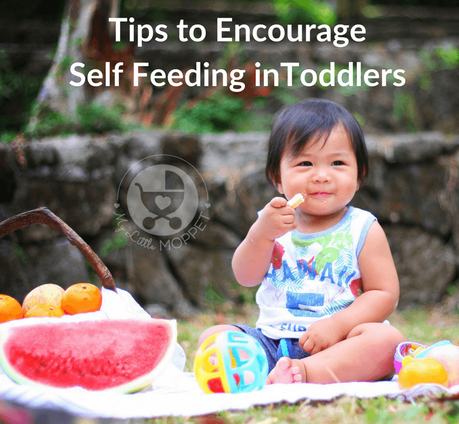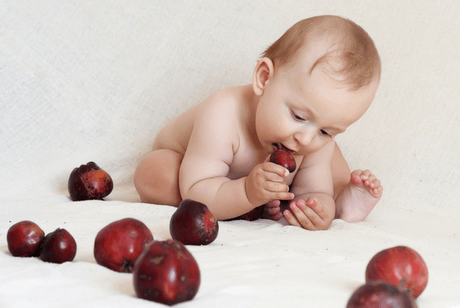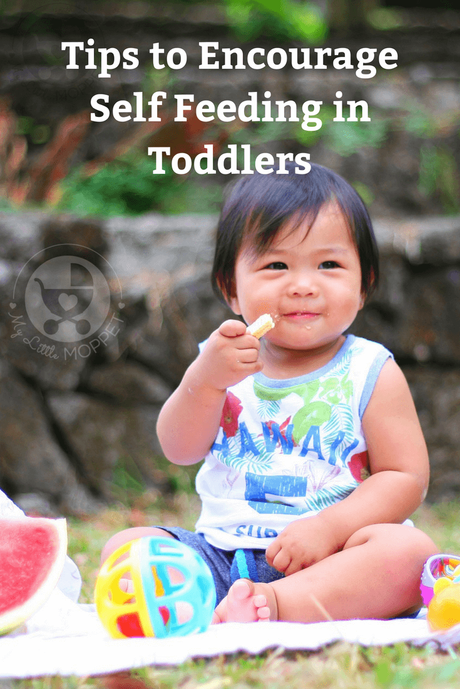July 11, 2018 Leave a Comment
SharePinWith babies, nothing comes easy; every habit and every successful milestone is a result of someone’s effort. It could be you, your nanny, your spouse, the siblings or even strangers.
These admirable traits you see in a child out there – they are cultivated. That’s why we celebrate milestones.
There are some easily celebrated milestones, especially those that are one-off or those that happen in a short span; your baby’s first steps, successful potty training, first words and so on. Apart from these, there’s sitting up, the first day in school, first haircut and first whole night of sleep and the list goes on and on. It’s amazing how this one milestone is hardly celebrated; the ability to self feed.
It takes great effort for a child to self- feed reliably. Self feeding in children comes in phases, making it a long drawn out, but extremely rewarding, journey for you and your child. Although your child needs to reach toddlerhood to have the physical ability to self feed, it helps to start early. Here are some age-wise tips to encourage self feeding in toddlers.
Tips to Encourage Self Feeding in Toddlers

6 – 9 Months:
The baby learns to hold the bottle on their own. Too early you think? Not really. Babies at this age are already putting their fingers in their mouth. It’s important to ensure that the baby is comfortably seated, preferably on a high chair and with feeding gear. This stability gives them the courage to lift the bottle back and forth. Keep the baby company and cheer them along the way.
9 – 12 Months:
This is the ideal age for introducing finger foods. Offer soft yet firm foods like diced fruit and cheese bites.
At this age, the baby learns to reach out and grab a spoon or a snack and he also learns to pick things up with the forefinger and the thumb (commonly referred to as pincer grasp). However, this finer grasp will only come after the stage of grabbing food with their fist and smearing it all over their face while trying to trace the mouth.
They will also put their whole hand in the mouth before they learn to take control and use fingers instead. They still don’t have enough hand-eye coordination but continuous encouragement helps them get better.
Let them hold the spoon first. Then hold their hand gently and guide the spoon to pick food and take it to the mouth. In a while, they will tighten their grip so you no longer need to hold their hand. Allow baby to be in control, don’t be too quick to help, he will never learn that way. Let him struggle a bit. Do this minimally to avoid the baby getting frustrated.
12 – 18 Months:
At this point, the baby has learnt to move a spoon or fork from the plate to the mouth and vice versa. Their motor ability has greatly improved. Present them with as many opportunities as possible. Realize that this is a habit they will keep all their life and so you want to set a good example.
This is the perfect time to set the stage for hygienic habits like washing hands, wiping their mouth after a meal and using napkins. Eat together with the baby, offer your food but serve a little food in a bowl with a spoon to get baby used to eating from his own plate.
Prepare for lots of mess. Dress the baby in older clothes while feeding, and place a mat or shower curtain under the high chair to catch the mess. This helps you enjoy the journey rather than stressing on the mess. Babies can pick up on this frustration and get anxious too. When you serve, let the baby play with the food; it is how they learn.
1.5 – 4 years:
As your child grows, he or she gets stronger control and can now eat neatly. She can also decide when the food is tasty, hot or cold, as well as if they are full. Insist upon age appropriate table manners, like sitting at the table with the rest of the family, chewing with a closed mouth and excusing oneself before getting up.

Things to Remember:
1. Pick mealtimes when the baby is active. Teaching your baby anything when she is sleepy or grumpy will make you frustrated and your efforts may go to waste.
2. Be consistent. Offer many opportunities preferably at every meal time to ensure the baby associates self-feeding with meal-time.
3. Make meal times fun. You can make it a game where you hold something up and let the baby grab it from you. This helps build the ability to concentrate and also enhances motor skills.
4. Avoid using sweets to bribe the baby or catch her attention. Instead, use activities like a game so that the child does not consider regular meals as inferior to sweets.
5. Help the baby focus by turning off distractions like the TV or smartphone.
6. Put in the effort to make food attractive. Include different colors and textures – this also ensures that your baby gets a variety of nutrients and can practice chewing.
7. Let the baby get hungry enough before mealtime, but not too hungry. Avoid lots of snacks in between meals that may spoil his appetite.
8. Keep the baby hydrated. Some foods can easily cause constipation and make your efforts feel worthless.
9. Respect your baby’s choices. Include at least one of his favorites at every meal. When he indicates that he’s full, don’t force him to eat more.
10. For toddlers, ask them to help you prepare food. They will be more willing to eat something that they have had a hand in preparing.
Finally; be patient. It can take several tries for a baby to even accept a food, let alone eat it by herself. Don’t give up, and don’t get stressed. By staying cool and consistent, you and your baby can enjoy this lovely journey.

Author

Kate Ndigirigi is a Mom, full-time banker, and part-time freelancer. She loves writing and parenthood topics top her list of favorite niches. Her hobbies include music, traveling, motivational speaking and reading inspirational books.
SharePinFiled Under: Babyled Weaning, Parenting Tagged With: FEEDING, feeding fussy toddlers, feeding the baby, parenting, parenting tips, self feeding
